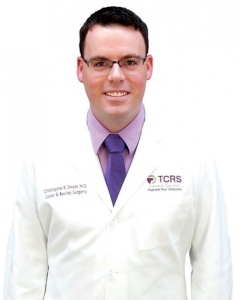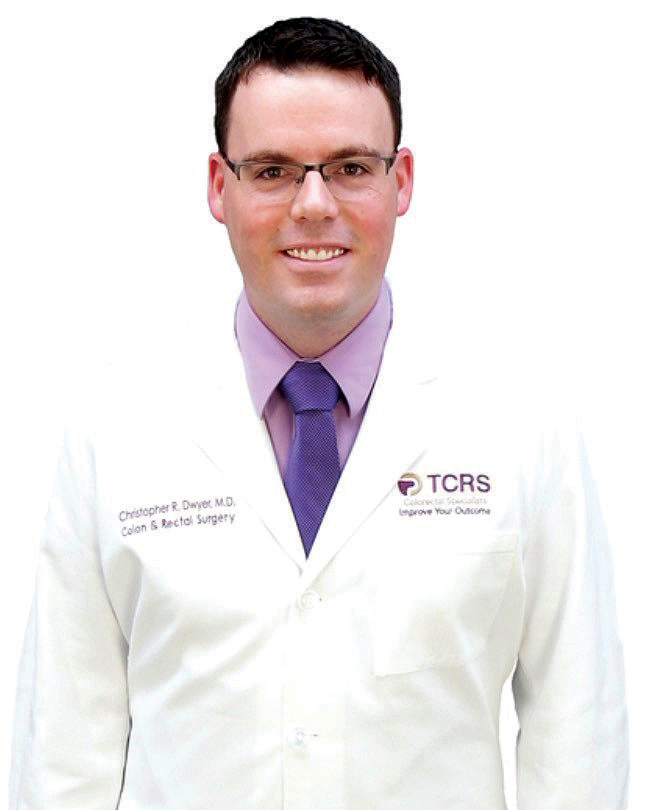
Dear Arlington resident,
Have YOU been screened for colon cancer? If not, consider this column an alarm sounding.
As a relatively new physician to Medical City Arlington, I’m shocked by the number of emergency colon cancer cases I’ve seen. In just the two weeks prior to my writing this column, I performed four urgent operations for life-threatening colon cancers so large they have almost completely obstructed the colon. In each case, there were clear signs that went unnoticed.
I believe we can do better at fighting the war against colon cancer and save the lives of our loved ones. Colorectal cancer is the third leading cause of cancer-related deaths in women in the United States and second leading cause in men, according to the American Cancer Society.
Many times, patients attempt to normalize signs and symptoms that could lead to effective and early diagnosis. Here are some of the recent things I’ve heard patients say.
“This bleeding is probably just my hemorrhoids.”
“I’m not regular on the toilet because I’m always stressed out.”
“I didn’t think colon cancer could affect me so young.”
I encourage people not to second guess or convince themselves against taking action and getting checked out by a qualified doctor. Here’s how we can stop colon cancer together:
Prevention – Colon cancer is linked to all the things in life that feel good: eating poorly, smoking, drinking alcohol and a sedentary lifestyle. Get up off the couch! Walking 30 minutes three times a week can help. Stop smoking. As for the other things, moderation is the key to a healthy lifestyle. A diet rich in fruits, vegetables and dietary fiber is associated with a lower incidence of colon cancer. Some vitamins like calcium, selenium and folate have been shown to lower risk, as well.
In addition to changing your lifestyle, recognizing the signs and symptoms of colon cancer can be the first step to identifying a problem. These signs are typically changes in bowel habits, diarrhea, blood in the stool and new cramping or bloating. Ask your doctor about these symptoms the next time you see him or her.
There are risks that you cannot control. For instance, people of African descent, including African-Americans, require a routine screening colonoscopy five years earlier than the general population. They should begin their screening at the age of 45 instead of 50 years old. Most importantly, 20 percent of colon cancers are related to family. If you have a first degree relative (parent, sibling or child) who has experienced colon cancer, then you have a 3-fold increase in risk over the general population. If you have two or more second degree relatives, then the increased risk is the same. Additionally, you should begin your screenings 10 years prior to your relative’s age when they were diagnosed. So if your father had colon cancer at 55 years old, you should start your screenings at 45 years of age.
Education – As your partner in this fight, I will make myself available to speak to any group in the Arlington area regarding the importance of colon cancer screening and to help increase awareness of colorectal cancer. Additionally, I am participating in an event this month called the Undy Run/Walk, which helps raise money for colorectal cancer research. For every dollar we raise, 86 cents goes to patients and families in need that are suffering from colon and rectal cancer.
Screening – Visit your primary care office and ask for the appropriate screening. If you have no risk factors and no symptoms, laboratory testing such as FIT or Cologuard® may be appropriate for you. Right now, the gold standard for screening is a well performed colonoscopy with a trained endoscopist like a colon and rectal surgeon or gastroenterologist.
If you discover you have cancer, treatment can be a frightening thought. It’s important to find the right physician partner for the journey. I educate my patients during the entire process from diagnosis, to surgery and to surveillance long after surgery. I do all of this at my office at Medical City Arlington, providing that comfort and compassionate care where Arlington residents need it – close to home.
It’s my life’s mission to turn colon cancer into a relic of the past. Join me and let’s win this fight together!
Sincerely,
Christopher R. Dwyer, MD
Texas Colon and Rectal Specialists















